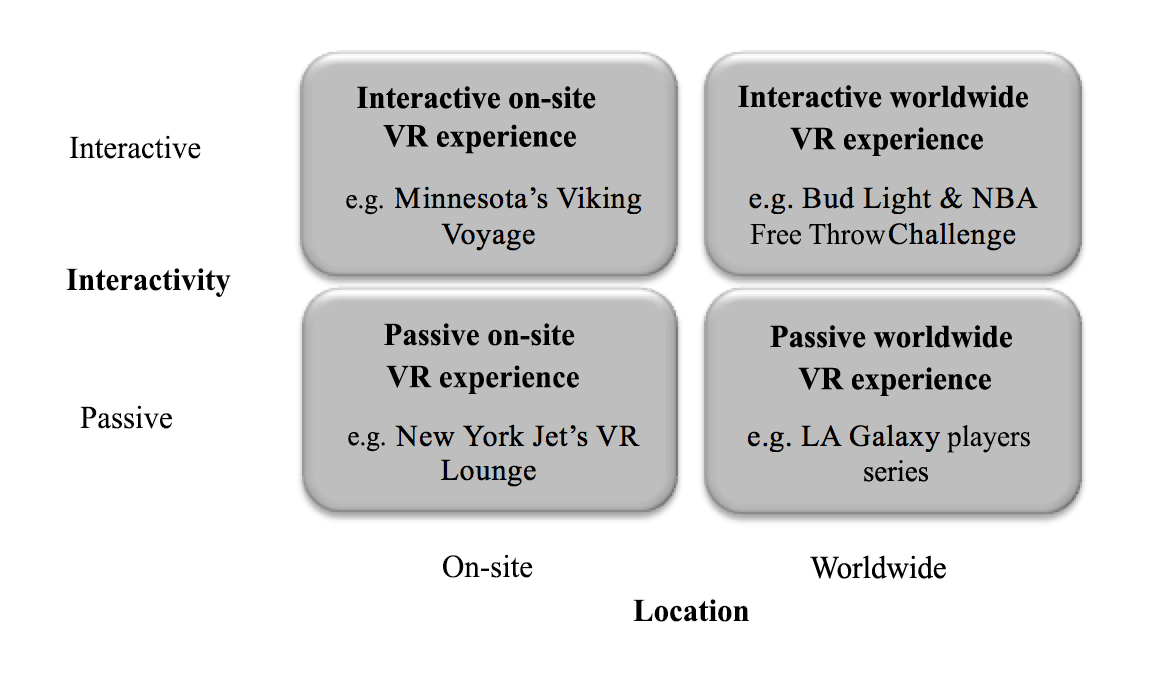
Or: How MBS Students Find Great Jobs Through Their Thesis
Virtual Reality (VR) is currently one of the buzzwords in digitization and marketing. While first attempts in the early 1990s were not particularly successful, Samsung Gear VR, Google Cardboard and Oculus Rift have succeeded at restarting VR in 2016.[1] Indeed, in less than a single year, venture capitalists and technology giants such as Facebook have developed a huge interest in VR, along with other companies, which have been experimenting with this technology in the area of marketing.[2] For example, just before Christmas, Coca-Cola invited its customers in shopping centres to a virtual ride with Santa Claus in his reindeer sleigh. The Marriott hotel chain offered newly-wed couples at a New York marriage registration office a virtual honeymoon trip to London or Hawaii, using the Oculus Rift headset in a teleporter (see below video).
Virtual Reality is understood to be “an environment created by a computer or other media, an environment in which the user feels present”[3]. This means that a human can dive into a world that is simulated by a computer and interact with it. The KZero consulting company estimates that the current number of 43 million VR users worldwide will rise to 171 million in the year 2018.[4] Sales revenues are predicted to rise to USD 80 billion by 2025, with this figure comprising USD 45 billion from hardware and USD 35 billion from software components.[5]
Opportunities of VR as Topic of an MBS Thesis
Given this background, MBS student Isabell Kroiß, who has since graduated, devoted her thesis to investigating the possibilities for integrating Virtual Reality into digital sports sponsoring. She drew on the contents of her Master Sports Business and Communication studies at Munich Business School and on her personal experience during her semester abroad at Columbia University in New York City. She was especially interested in the target group of digital natives, for these are especially technology affine and could thus be an important audience in this area. She did not just concentrate on existent literature and best practice examples, but also initiated focus groups directly with the target group of digital natives and conducted numerous interviews with experts from agencies, companies, and sports clubs. These included FC Bayern Munich, Microsoft, MediaMarkt, FIFA and the Serviceplan agency.
The Challenge of Digital Marketing
One thing is clear: due to the enormous quantities of information and impressions that reach everybody every day, including, most especially, consumers in economic contexts, it has become virtually impossible for companies to direct much attention to a particular product or service. The traditional channels of communication are receding in importance and have to be deployed in other ways. [6]
This is no different in the world of sports, regardless of whether a fan experiences a sports event live, or follows it on television or a smart device. Classical advertising formats such as television, banner, sports jersey, and sponsor displays are only a few examples in this connection. Sponsors have known this for a long time and are now also using the new, digital advertising formats. Virtual Reality is regarded as a very promising business innovation for keeping in touch with customers and especially with existent and future fans in the world of sports.[7] One reason for this is that Virtual Reality makes it possible to tell stories in a new way.[8] Emotional brand experiences and highlights at sports events in which one is not able to participate in person as well as glimpses behind the scenes can also be transported via Virtual Reality. For example, sponsors can function as presenters of the VR content or the products of a sponsor can be integrated in the context of a VR performance.
The following matrix, which is based on the dimensions of interactivity and location, shows how sponsors and sports clubs can interact in this context. A distinction is drawn between whether the dialogue is conducted through passive use of VR technology (i.e. the fans can watch, say with 360 degree videos, but cannot interact) or whether the dialogue is conducted via interactive use of VR technology. A second distinction is drawn between whether the VR situation is implemented on site – for example, in a stadium − or whether the fans experience the technology at home or someplace else on earth.
 When building their new stadium, the Minnesota Vikings NFL team recognized the great potential of VR and created the Vikings Voyage, which is a high-tech fan experience in which, for example, fans can test their athletic capabilities by catching a virtual pass using a VR device.[9] Then the New York Jets set up an entire VR lounge during three home games of the past season in their Metlife Stadium, where fans could undergo VR experiences such as running through the player tunnel.[10] Bud Light was one of the first sponsors in America to make VR experiences possible outside the stadium. During the All-Star Weekend, fans in New Orleans were able to throw free throws against their idols in a VR version of Madison Square Garden.[11] LA Galaxy likewise recognized the potential of VR early on and made a six part interview series in 360 degree videos with the players Ashley Cole, Gyasi Zardes, Jelle Van Damme, Steven Gerrard, and Robbie Keane. This experience made it possible for the fans to come even closer to their idols and the club as, for example, the fans were able to enter the players’ dressing room and visit Steven Gerrard’s favorite places in L.A.[12]
When building their new stadium, the Minnesota Vikings NFL team recognized the great potential of VR and created the Vikings Voyage, which is a high-tech fan experience in which, for example, fans can test their athletic capabilities by catching a virtual pass using a VR device.[9] Then the New York Jets set up an entire VR lounge during three home games of the past season in their Metlife Stadium, where fans could undergo VR experiences such as running through the player tunnel.[10] Bud Light was one of the first sponsors in America to make VR experiences possible outside the stadium. During the All-Star Weekend, fans in New Orleans were able to throw free throws against their idols in a VR version of Madison Square Garden.[11] LA Galaxy likewise recognized the potential of VR early on and made a six part interview series in 360 degree videos with the players Ashley Cole, Gyasi Zardes, Jelle Van Damme, Steven Gerrard, and Robbie Keane. This experience made it possible for the fans to come even closer to their idols and the club as, for example, the fans were able to enter the players’ dressing room and visit Steven Gerrard’s favorite places in L.A.[12]
It has been shown that a great variety of good ways to use VR – mostly from the USA – are being realized in digital sports marketing and that individual adventures for customers, tangible brand experiences, and marketing events are experienced in an entirely different manner. Unique fan experiences can be implemented with the result of greater fan loyalty. Sponsors become able to direct much more attention to their products and services in an innovative way.
The Journey Is Just Starting
Where do we go from here? The experts whom Isabell Kroiß interviewed for her thesis all agreed: We are just at the beginning of this journey, just like we started with the iPhone ten years ago. The summary of the Changing the Game Summit in 2016 in Silicon Valley was similar: “Virtual reality is the future and the future is now − VR will revolutionize player training and fan engagement.”[13]
Together with other developments such as Augmented Reality, eSports and Digital Overlay, the decisive steps will be those of developing an integrated approach in sponsoring and finding ways to monetize the innovative technologies accordingly. The agenda will also have to include challenges such as that of providing high-quality content through the VR devices and actual “isolation” of the fans while they are using VR technology. Avatars of friends and football stars, for example, can be of great importance in regards to this latter challenge.
It was not surprising that precisely these points came up in the focus groups with a number of digital natives. While the participants found that the experience with the VR content by means of a Samsung Gear VR headset used by Isabell Kroiß was interesting, stimulating, and appealing, they were also somewhat overtaxed by the many different impressions so that they scarcely noticed the sponsors that were integrated in the virtual reality clip. One statement of the digital natives was also interesting in this connection, namely that they would certainly like to use the devices once in a while, but at the moment probably not regularly − and, above all, that they would not be willing to pay a user fee for this.
A Successful Career Start
With that, the future is full of suspense regarding further use of Virtual Reality in general (see, for example, the ideas of Facebook) and in digital sport sponsoring in particular.
In any case, Isabell Kroiß’s career has already gotten off to a good start through her thesis in the area of Virtual Reality. When it was finished, she received a job offer from LOBECO immediately. LOBECO is a consulting firm for digital communications, which advises quite a number of clients in the areas of social media and innovations such as Virtual Reality, including, for example, FC Bayern Munich, HypoVereinsbank, and Paulaner. Now Isabell will be able to apply the knowledge of virtual reality, which she has accumulated through her thesis, expand this knowledge, and work in an inspiring environment.
[1] Virtual Reality Society. (2016). History Of Virtual Reality. Retrieved from https://www.vrs.org.uk/virtual-reality/history.html (as of February 25, 2017)
[2] Fermoso, J. (2016). Facebook invests $250m more in VR as Zuckerberg shows off wireless Oculus. Retrieves from https://www.theguardian.com/technology/2016/oct/06/zuckerberg-facebook-virtual-reality-wireless-oculus-connect-3 (as of April 15, 2017)
[3] Biocca, F. (1992). Communication Within Virtual Reality: Creating a Space for Research. Journal of Communication, 42(4), p.5.
[4] Rham, Y. (2016). 5 Gründe, warum Marken nächstes Jahr an VR nicht vorbeikommen. Retrieved from http://www.horizont.net/tech/kommentare/Virtual-Reality-5-Gruende-warum-Marken-naechstes-Jahr-an-VR-nicht-vorbeikommen-144720 (as of February 1, 2017)
[5] Weinswig, D. (2016). Virtual And Augmented Reality Become Realistic Revenue Generators. Retrieved from https://www.forbes.com/sites/deborahweinswig/2016/10/26/virtual-and-augmented-reality-become-realistic-revenue-generators/#12646e916fc5 (as of February 10, 2017)
[6]Kraft, P. / Jung H. H. (2016): Auf dem Weg zum smarten Kunden – Herausforderungen und Lösungsansätze für das Marketing. In: Jung, H. H., & Kraft, P. (2016). Digital vernetzt. Transformation der Wertschöpfung. München: Carl Hanser Verlag.
[7] Adams, R. L. (2016). Five Ways Virtual Reality Will Change The World. Retrieved from https://www.forbes.com/sites/robertadams/2016/10/17/5-ways-virtual-reality-will-change-the-world/#69d573152b01 (as of February 9, 2017)
[8] Chen, I. (2015). What’s Virtual-Reality Marketing and why it’s named the Next Big Advertising Medium? Retrieved from https://www.linkedin.com/pulse/whats-virtualrealitymarketing-why-its-named-next-big-advertising/?trkInfo=VSRPsearchId%3A2622495561485275168042%20%2CVSRPtargetId%3A6080286254585360384%2CVSRPcmpt%3Aprimary&trk=vsrp_influencer_content_res_name (as of February 23, 2017)
[9] Peters, C. (2016). “Vikings Voyage” Features a Virtual Reality Experience at U.S. Bank Stadium. Retrieved from http://www.vikings.com/news/new-stadium/article-1/Vikings-Voyage-Features-a-Virtual-Reality-Experience-at-US-Bank-Stadium/420fd37b-983a-4b6e-98e4-663526b3c46a (as of March 22, 2017)
[10] Burns, M. (2016c). New York Jets President Neil Glat Chats Digital Ticketing, Social Influencers, Virtual Reality. Retrieved from http://www.sporttechie.com/2016/12/19/expert-series/new-york-jets-president-neil-glat-chats-digital-ticketing-social-influencers-virtual-reality/ (as of March 22, 2017)
[11] Andrews, K. (2017). Bud Light, Viewer Ready Provide NBA Fans Free Throw Shooting VR Experience In New Orleans. Retrieved from http://www.sporttechie.com/2017/02/23/virtual-reality/bud-light-viewer-ready-provide-nba-fans-free-throw-shooting-vr-experience-new-orleans/ (as of February 17, 2017)
[12] Slye, H. (2016). The LA Galaxy Are Focused On Telling Player Stories With Virtual Reality.Retrieved from http://www.sporttechie.com/2016/09 /05/industryinsights/interviews/the-la-galaxy-are-focused-on-telling-player-stories-with-virtual-reality/ (as of March 20, 2017)
[13] Fenway Sports Management. (2016). 7 Emerging Tech Trends That Are Changing the Sports Marketing Game. Retrieved from http://www.businesswire.com/news/home/20160804006476/en/7-Emerging-Tech-Trends-Changing-Sports-Marketing (as of February 21, 2017)





